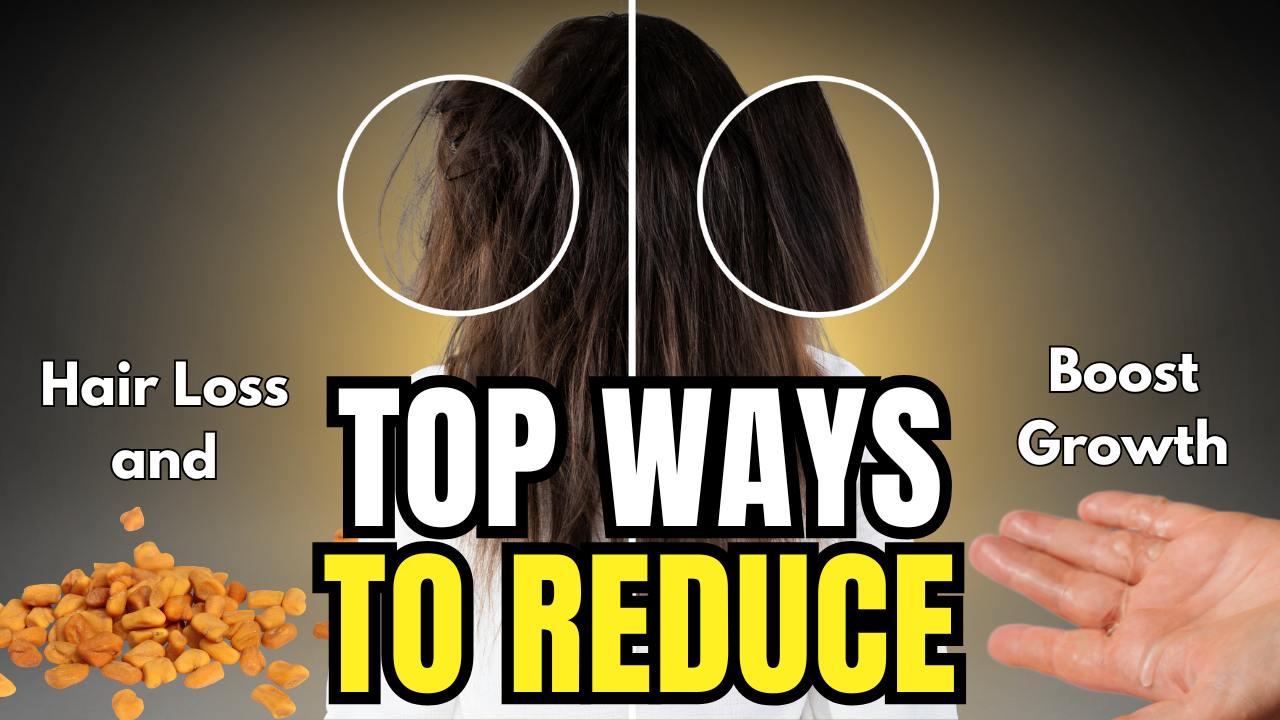Hair loss affects millions of people globally, often leading to a decline in confidence and emotional well-being. Though commonly viewed as a cosmetic concern, the psychological toll it takes is real. Whether it’s caused by genetics, stress, medical conditions, or hormonal imbalances, identifying the root cause is the first step toward managing it effectively.
One of the top ways to reduce hair loss is to adopt a balanced, nutrient-rich diet. Foods rich in vitamins A, C, D, E, zinc, iron, and protein support hair follicle health and promote stronger strands. Avoiding harsh chemical treatments, heat styling, and tight hairstyles also helps minimize breakage and stress on the scalp.
Additionally, managing stress through mindfulness, adequate sleep, and regular exercise plays a critical role. For persistent cases, consulting a dermatologist or trichologist can lead to more personalized treatments like medicated shampoos, supplements, or advanced therapies to address hair loss at its source.
The good news? There are effective ways to reduce hair loss, promote healthy growth, and maintain strong, lustrous hair. In this in-depth guide, we’ll explore the top 8 tips to reduce hair loss, backed by science and supported by real-life success stories.
Understanding Hair Loss: Why Does It Happen?
Before diving into solutions, it’s essential to understand what causes hair loss. On average, it’s normal to shed 50 to 100 hairs a day as part of the natural hair growth cycle. However, when this balance is disrupted, it can lead to excessive shedding or thinning. Factors such as genetics, hormonal changes, aging, stress, poor nutrition, and underlying medical conditions like thyroid disorders can all contribute to hair loss.
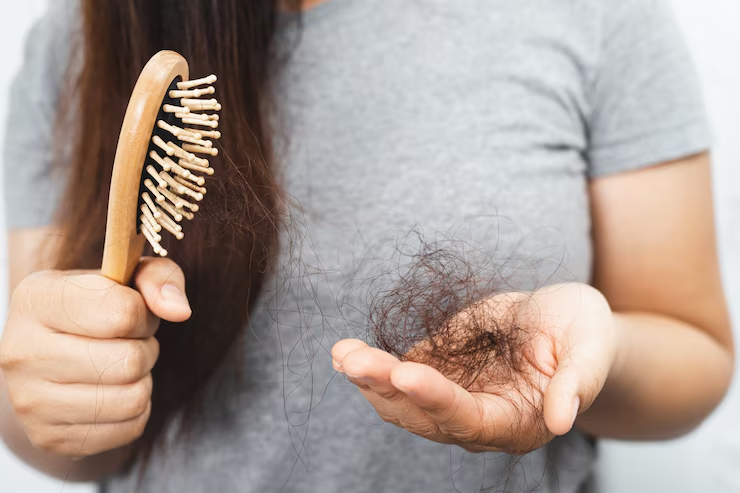
One of the top ways to reduce hair loss is by addressing dietary deficiencies. Hair needs essential nutrients to grow and stay strong—particularly iron, zinc, biotin, vitamin D, and protein. A diet rich in leafy greens, nuts, eggs, fish, and whole grains can significantly support hair health from within.
Scalp care is another important focus. Keeping the scalp clean, gently massaging it to improve blood circulation, and using mild shampoos can promote healthier follicles. Avoiding heat styling, harsh chemicals, and tight hairstyles also minimizes damage and prevents breakage.
Managing stress is equally crucial. High stress levels can trigger hair shedding, so incorporating practices like meditation, yoga, and regular exercise can help. For persistent hair loss, consult a healthcare professional for personalized advice.
Genetics (Androgenetic Alopecia)
Hormonal imbalances (Thyroid issues, PCOS, menopause)
Nutritional deficiencies (Iron, zinc, vitamin D, biotin)
Stress and anxiety
Poor scalp hygiene
Use of harsh hair products or excessive heat
Medical conditions and medications
Infections like fungal scalp infections
Understanding the cause helps you choose the right remedy. Let’s explore the top 8 ways to reduce hair loss effectively.
Improve Your Diet: Feed Your Hair from Within
Hair is primarily made of keratin, a type of protein that requires proper nutrition to grow strong and healthy. When the body lacks essential vitamins and minerals like iron, zinc, vitamin D, and biotin, it can lead to weakened strands and increased hair fall. Nutritional deficiencies are one of the most common, yet overlooked, causes of hair loss.
One of the top ways to reduce hair loss is to improve your diet with hair-healthy foods. Include leafy greens, nuts, seeds, eggs, fish, and whole grains to ensure your body receives the nutrients it needs. Hydration also plays a role—keeping your body and scalp well-hydrated supports hair health and prevents dryness and breakage.
In addition to diet, lifestyle choices matter. Reducing stress, getting enough sleep, and avoiding harsh hair treatments all contribute to healthier hair. Scalp massages and gentle care routines can improve circulation and support natural hair regrowth over time.
Key Nutrients to Include:
Protein: Eggs, chicken, tofu, lentils, nuts
Iron: Spinach, red meat, pumpkin seeds
Omega-3 Fatty Acids: Salmon, walnuts, flax seeds
Biotin (Vitamin B7): Eggs, almonds, sweet potatoes
Vitamin D: Sun exposure, fortified dairy, mushrooms
Zinc: Chickpeas, cashews, whole grains
Pro tip: Consider a multivitamin supplement if your diet lacks variety, but always consult your doctor first.
Practice Gentle Hair Care: Be Kind to Your Scalp
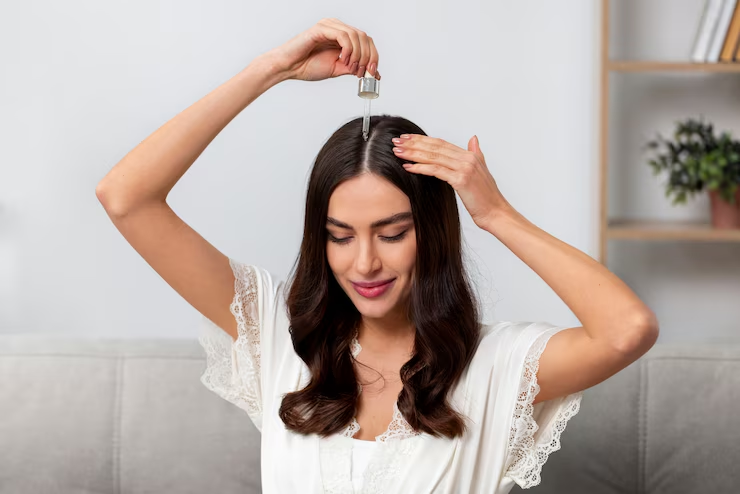
Rough handling, frequent heat styling, and over-washing can all lead to damaged hair. These habits weaken the hair shaft, making it more prone to breakage and shedding. Using harsh shampoos, brushing wet hair aggressively, or pulling it tightly into styles can further aggravate hair loss over time.
One of the top ways to reduce hair loss is to adopt gentle hair care practices. Use a mild, sulfate-free shampoo and avoid washing hair daily unless necessary. Pat your hair dry instead of rubbing it with a towel, and use a wide-tooth comb to detangle. Limiting the use of hot tools like straighteners, curling irons, and blow dryers can help maintain hair strength and moisture balance.
Protective hairstyles and regular trims also promote healthier hair. Additionally, applying natural oils like coconut or argan oil can nourish and shield hair from environmental stressors. With consistent care, you can minimize breakage and encourage thicker, stronger growth.
Tips for Gentle Hair Care:
Use sulfate-free shampoos and conditioners suited to your hair type.
Wash your hair 2-3 times a week to prevent scalp buildup and excessive dryness.
Avoid brushing wet hair. Use a wide-tooth comb.
Pat your hair dry with a microfiber towel instead of rubbing harshly.
Avoid tight hairstyles like ponytails or braids that pull on the scalp.
Pro tip: Consider switching to a silk pillowcase to reduce friction and prevent breakage while you sleep.
Scalp Massage and Oil Therapy: Boost Circulation Naturally
Scalp massages are a simple yet effective method to support hair health. By using your fingertips to gently massage the scalp, you stimulate blood flow to the hair follicles. This increased circulation helps deliver more oxygen and nutrients, which are vital for healthy hair growth and strengthening the roots.
Among the top ways to reduce hair loss, incorporating regular scalp massages stands out for its ease and benefits. You can use natural oils like coconut, castor, or rosemary oil during the massage to further nourish the scalp and enhance results. Massaging for just 5–10 minutes a few times a week can make a noticeable difference over time.
In addition to promoting growth, scalp massages help reduce stress—another major contributor to hair fall. This calming self-care routine not only boosts follicle activity but also supports relaxation and mental well-being. When combined with good nutrition and proper hair care, it becomes a powerful tool in hair loss prevention.
How to Do It:
Use your fingertips in circular motions for 5–10 minutes daily.
Combine with oils like:
Coconut oil: Nourishing and antifungal
Castor oil: Rich in ricinoleic acid for promoting hair growth
Rosemary oil: Clinically shown to be as effective as minoxidil for some people
Peppermint oil: Stimulates blood circulation
DIY Growth Blend: Mix 2 tbsp coconut oil + 1 tbsp castor oil + 5 drops rosemary oil. Warm slightly, massage into scalp, and leave overnight.
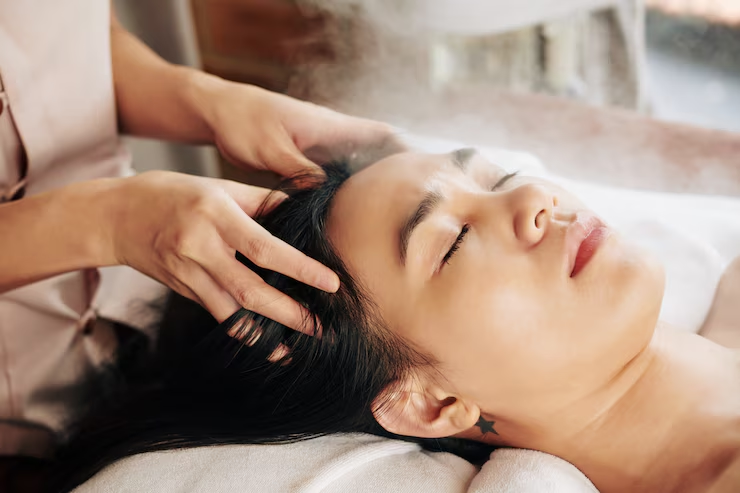
Manage Stress Levels: Your Hair Reflects Your Mind
Chronic stress is a major but often underestimated cause of hair loss. It can trigger a condition known as telogen effluvium, where a significant number of hair follicles enter the resting phase too early. This results in increased shedding and noticeable thinning, often occurring a few weeks or months after a stressful event.
One of the top ways to reduce hair loss is to effectively manage and reduce stress. Incorporating relaxation techniques such as deep breathing, yoga, or meditation into your daily routine can help calm the mind and reduce the physical impact of stress on the body. Regular physical activity also plays a key role in lowering stress hormones and boosting mood.
In addition, getting enough sleep and maintaining a balanced lifestyle supports overall wellness, including hair health. When your body feels more balanced and relaxed, it’s better able to support the normal hair growth cycle and minimize excessive shedding.
Stress-Reduction Techniques:
Yoga and meditation: Just 15 minutes a day can lower cortisol.
Exercise: Increases blood circulation and reduces anxiety.
Deep breathing: Practice 4-7-8 breathing to relax instantly.
Journaling or therapy: Address underlying emotional causes.
Pro tip: Try adaptogenic herbs like ashwagandha or rhodiola rosea (with medical advice) to manage stress levels naturally.

Use Natural Remedies: Time-Tested Treatments
Using natural remedies is one of the oldest and most trusted methods to support hair health and reduce shedding. Ingredients like aloe vera, onion juice, amla, hibiscus, and fenugreek have been used for centuries in traditional hair care practices. These natural treatments are packed with antioxidants, vitamins, and minerals that nourish the scalp and strengthen hair roots.
Among the top ways to reduce hair loss, incorporating natural remedies into your weekly routine offers gentle yet effective results. For example, onion juice is known to improve blood circulation to hair follicles, while aloe vera soothes the scalp and balances pH levels. These remedies can be applied as masks or oils and left on for 30–60 minutes before washing off.
Natural treatments are not only chemical-free but also support long-term scalp health. With consistent use, they help reduce inflammation, improve hair texture, and promote regrowth—making them an affordable and safe addition to your hair care routine.
Popular Natural Remedies:
Aloe vera: Reduces scalp inflammation and dandruff. Apply fresh aloe gel to the scalp for 30 minutes.
Onion juice: High in sulfur, stimulates regrowth in some cases. Blend onion, strain juice, apply to scalp for 15 minutes.
Fenugreek seeds: Soak overnight, grind into a paste, apply as a mask weekly.
Green tea rinse: Contains antioxidants that may boost hair health.
Important: Always do a patch test to avoid allergic reactions.
Medical Treatments: Science-Backed Solutions
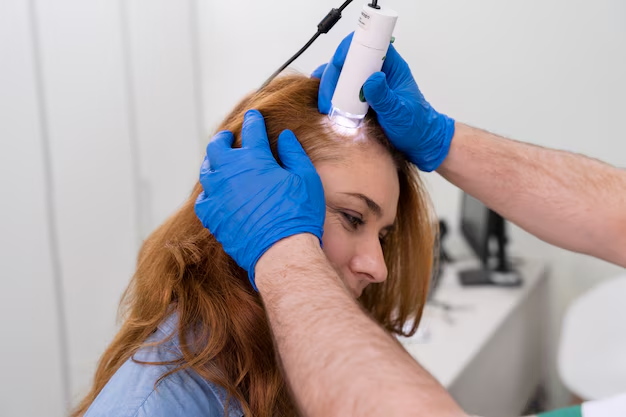
Medical treatments offer science-backed solutions for those experiencing significant or persistent hair loss. These therapies target the underlying causes, whether hormonal, autoimmune, or genetic. Common treatments include minoxidil (a topical solution) and finasteride (an oral medication), both approved for treating hair thinning and pattern baldness.
Among the top ways to reduce hair loss, medical treatments are particularly effective for individuals who haven’t seen results with natural remedies or lifestyle changes. Minoxidil helps by widening blood vessels and improving blood flow to hair follicles, while finasteride works by reducing DHT, a hormone linked to hair loss in men.
Advanced options like platelet-rich plasma (PRP) therapy or low-level laser therapy are also available, often recommended by dermatologists. These approaches stimulate hair regrowth and improve follicle health. For best results, consult a healthcare professional who can assess your specific condition and recommend a tailored treatment plan based on your needs.
FDA-Approved Treatments:
Minoxidil (Rogaine): Available over the counter; helps stimulate hair growth.
Finasteride (Propecia): Prescription-only; blocks DHT, a hormone linked to hair loss (for men).
Platelet-Rich Plasma (PRP) Therapy: Involves injecting your own blood plasma into the scalp to stimulate growth.
When to See a Dermatologist:
If your hair loss is sudden or accompanied by redness, itching, or patches.
If you have a family history of baldness and want to take early preventive measures.
If no home remedy seems to work within 3–6 months.
Avoid Heat and Chemical Damage
Frequent use of hair straighteners, curling irons, and chemical treatments like bleach or hair dye can severely weaken hair strands. These tools and products strip hair of its natural moisture, making it brittle, dry, and prone to breakage. Over time, this damage can lead to thinning and excessive hair shedding.
One of the top ways to reduce hair loss is to minimize the use of heat styling tools and harsh chemical treatments. When heat is necessary, always use a heat protectant spray to reduce damage. Opting for natural hairstyles and air-drying your hair can significantly improve its health and strength over time.
In addition, choose hair products that are free from sulfates, parabens, and alcohols, which can further dry out and damage hair. Regular deep conditioning, oil treatments, and gentle handling are essential to restore moisture and maintain healthy strands, helping to prevent long-term hair loss caused by styling damage.
Protective Habits:
Limit heat styling to once a week or less.
Always use a heat protectant spray.
Choose ammonia-free hair colors or opt for natural henna.
Avoid frequent bleaching or perms.
Pro tip: Try protective hairstyles or go heatless with braids, rollers, or twist-outs.
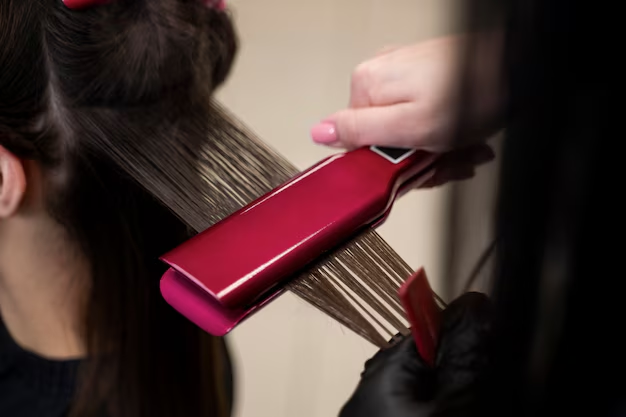
Stay Hydrated and Sleep Well: Restore from Within
Staying hydrated and getting quality sleep are essential yet often overlooked factors in maintaining healthy hair. Dehydration can lead to a dry, flaky scalp and brittle strands, while poor sleep disrupts the body’s natural repair processes, including those that support hair growth. Your body needs rest and fluids to function optimally—inside and out.
Among the top ways to reduce hair loss, drinking enough water daily helps transport essential nutrients to your hair follicles, keeping them nourished and active. Aim for at least 7–8 glasses of water a day to support overall hydration and scalp health. A well-hydrated scalp provides the ideal environment for strong, healthy hair.
Sleep is when your body heals and regenerates. Getting 7–9 hours of uninterrupted rest each night helps balance hormones, reduce stress, and promote cellular repair—all crucial for hair growth. Pair hydration and sleep with a healthy routine to naturally strengthen hair from within.
Healthy Habits to Adopt:
Drink at least 8–10 glasses of water daily.
Sleep 7–8 hours each night to allow your body to regenerate.
Elevate your head slightly during sleep to improve scalp circulation.
Lack of sleep can disrupt your hormonal balance, especially melatonin, which also affects hair cycles.
Bonus Tips and Common Myths
Hair Loss Myths and Helpful Tips – What You Really Need to Know
Myth: Cutting your hair makes it grow faster.
Truth: While trimming your hair doesn’t directly impact how fast it grows, it does help maintain its health. Regular trims every 8–12 weeks remove split ends and prevent breakage, which can make your hair appear longer and thicker over time. So, while it doesn’t speed up growth, it does improve overall hair appearance—one of the top ways to reduce hair loss caused by damage.
Myth: Shampooing daily causes hair fall.
Truth: Washing your hair daily won’t cause hair loss unless you’re using harsh shampoos loaded with sulfates and parabens. These ingredients can strip your scalp of natural oils, leading to dryness and breakage. Instead, opt for gentle, sulfate-free shampoos with nourishing ingredients like aloe vera or biotin. Keeping your scalp clean is essential to support healthy hair follicles.
Additional Tips: Avoid smoking, as it restricts blood flow to the scalp and hair follicles, which can lead to thinning hair. Protect your hair from environmental damage like sun exposure and pollution by wearing hats or scarves when outdoors. And don’t skip those regular trims—keeping ends healthy is one of the simplest and top ways to reduce hair loss caused by split ends and breakage.
Quick Recap: Top Ways to Reduce Hair Loss
| Tip | Summary |
|---|---|
| 1. Improve Your Diet | Eat nutrient-rich foods like protein, iron, and biotin |
| 2. Gentle Hair Care | Avoid harsh handling, chemicals, and tight hairstyles |
| 3. Scalp Massage & Oil Therapy | Use coconut, castor, and rosemary oils |
| 4. Manage Stress | Practice yoga, meditation, and deep breathing |
| 5. Natural Remedies | Use aloe vera, onion juice, and fenugreek masks |
| 6. Medical Treatments | Try minoxidil, PRP, or consult a dermatologist |
| 7. Avoid Heat & Chemicals | Reduce use of flat irons, bleach, and colors |
| 8. Hydration & Sleep | Drink water and sleep 7–8 hours for cell repair |
Conclusion
Hair loss is not something that improves overnight—it’s a gradual process that requires time, consistency, and care. The key to long-term improvement lies in adopting a well-rounded routine that addresses your hair’s internal and external needs. From nutrition and hydration to gentle hair care, every small step plays a vital role.
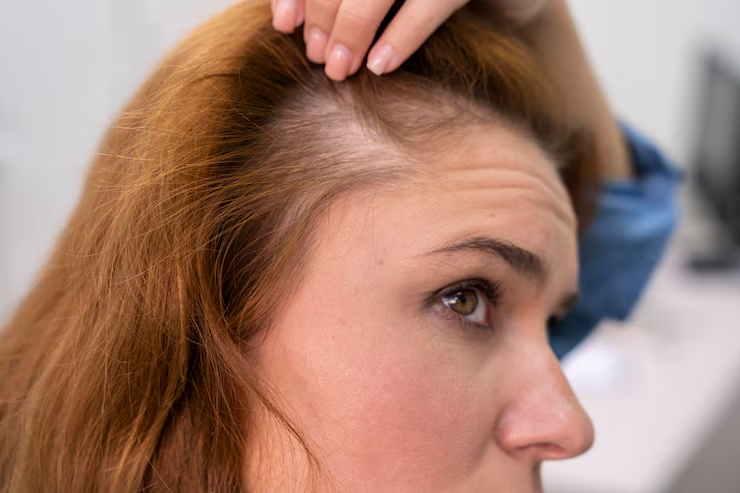
You don’t need expensive treatments or high-end products to see results. Many of the top ways to reduce hair loss involve simple, natural practices like using mild shampoos, massaging the scalp, managing stress, and following a balanced diet. These sustainable habits, when practiced regularly, can restore your hair’s health from the roots up.
If you’re experiencing persistent hair loss, know that you’re not alone—and it is possible to turn things around. Countless people have reversed hair thinning by making conscious lifestyle changes. Stay patient, trust the process, and prioritize self-care. Your hair journey is personal, and progress is always possible.
FAQs
Q.1 What are the top ways to reduce hair loss naturally ?
Some of the top ways to reduce hair loss naturally include eating a nutrient-rich diet, staying hydrated, reducing stress, avoiding harsh hair treatments, and using natural remedies like aloe vera or coconut oil.
Q.2 Can stress really cause hair loss ?
Yes, chronic stress can lead to a condition called telogen effluvium, where hair enters the resting phase prematurely. Managing stress through meditation, exercise, and sleep is one of the top ways to reduce hair loss.
Q.3 How often should I wash my hair to prevent hair loss ?
Washing 2–3 times a week with a gentle, sulfate-free shampoo is usually ideal. Over-washing with harsh products can damage the scalp—avoiding this is among the top ways to reduce hair loss.
Q.4 Do supplements help with hair loss ?
Yes, supplements containing biotin, zinc, vitamin D, and iron can support hair health. Using them wisely is considered one of the top ways to reduce hair loss when dietary intake is insufficient.
Q.6 Is it necessary to consult a doctor for hair loss ?
If your hair loss is severe or persistent, consulting a dermatologist can help identify the cause. Medical guidance combined with home care is among the top ways to reduce hair loss effectively.

